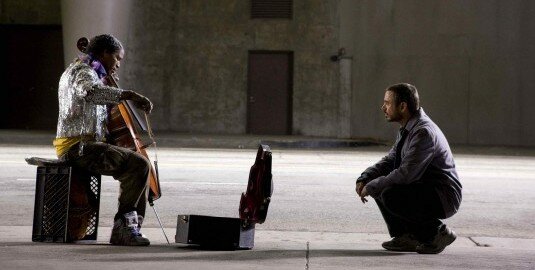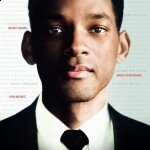It’s odd that The Soloist is playing quietly into cinemas during the early days of September, as if deliberately out of earshot of the upcoming awards season. It looked set to be a sure-fire Oscar contender; not only does it star two of Hollywood’s finest actors, Robert Downey Jr. And Jamie Foxx, it’s also based on a true story that deals with mental illness, poverty and the human spirit. How could the Academy resist?
Easier than you’d think. Despite being almost exclusively tailored to pluck at our emotional strings, The Soloist is an oddly uninvolving experience. It follows LA Times journalist Steve Lopez as he searches for a poignant story for his weekly column. He comes across gifted street musician Nathaniel Ayres, playing on violin with only two strings beneath a statue of Beethoven. As luck would have it, Nathaniel’s life turns out to be the sob story of the decade; once a prodigious Cello player with a scholarship at the Juilliard Music School in New York, he suffered a mental breakdown that rendered him schizophrenic and homeless. Sure enough, Steve’s column touches the hearts of millions; one woman even sending him her unused Cello as a gift. The two eventually become friends, where Steve commits his spare time to helping Nathaniel get his life back on track, starting with getting him off the street. But helping someone who doesn’t want to be helped proves to be more difficult than he expected.

|
Ambitious to a fault, Susannah Grant’s screenplay constantly misplaces the interest of the viewer by meandering its way through an overabundance of themes and issues. The simple, but effective, story of amity overcoming adversity is lost to a sea of subplots; one depicting Nathaniel’s back-story through a series of flashbacks, another exposing on the homeless crisis of LA and yet another concerning Steve’s turbulent relationship with his ex-wife. Whilst these subplots do occasionally hit their mark –the film’s depiction of the derelict district of Skid Row is truly alarming – they more often than not divert our attention from the very place it should be; Nathaniel and Steve’s bromance.
As such, it’s neither the fault of Robert Downey Jr. or Jamie Foxx that we never actually believe in their friendship. Channelling his performance from 2007’s Zodiac, Downey Jr. uses his understated charisma and dry wit so as to not ham-up Steve’s transition from self-centred journalist to advocate of the underprivileged. Similarly, Foxx draws from his Oscar-winning performance in Ray to avoid coming across as a mentally disabled caricature, desperate for our sympathy. Catherine Keener as Steve’s ex-wife rounds out the cast, and whilst her performance is up to her usual high standard, her character adds little consequence to the story.
Admittedly, it is refreshing that director Joe Wright (Pride and Prejudice, Atonement) didn’t set out to schmultzify the screen, in a Pursuit of Happyness kind of way, even when the source material almost demands it of him. He’s done away with the grand, sweeping long shots of Atonement and adapted his lens to the confined, urban grime of downtown Los Angeles. Yet much like Grant’s screenplay, Wright’s direction often loses its focus; in an attempt to illustrate Nathaniel’s almost ethereal connection with music, he resorts to a colourful visualisation that flashes and warps to the beat of a Beethoven symphony. It’s as jarring as ever, and like a number of oddly distracting scenes, it works to make the film’s 117 minute runtime feel much longer.
 Follow the author Anders Wotzke on Twitter.
Follow the author Anders Wotzke on Twitter.
















